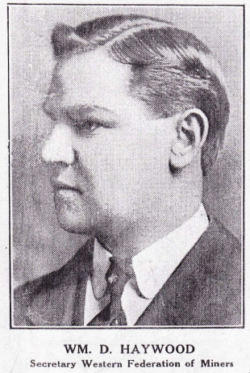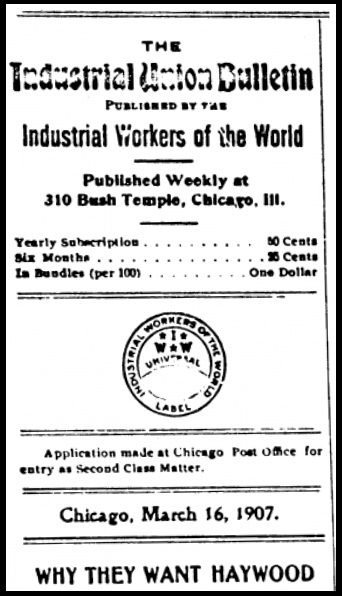There are no limits to which
powers of privilege will not go
to keep the workers in slavery.
-Mother Jones
~~~~~~~~~~~~~~~~~~~~~~~~~~~~~~~~~~~~~~~~~~~~~
Hellraisers Journal, Sunday March 31, 1907
From Caldwell, Idaho: Ida Crouch-Hazlett Reports

In this weeks edition of the Montana News, Ida Crouch-Hazlett reports her observations of the ongoing events in the case of our imprisoned comrades, Haywood, Moyer, and Pettibone. She first describes the mental anguish of the murderer, Harry Orchard, saved from despair and suicide by the application of good food and fine cigars. But most importantly, she reports that she was able to have a talk with Bill Haywood, just after the close of court one day in the town of Caldwell, wherein Big Bill gave his opinion of the current conflict now upsetting the unity of the Industrial Workers of the World. Big Bill stated that the “scum rises to the top,” and that the I. W. W. will be stronger once the scum is skimmed off.
Included in the report is an editorial from the March 16th edition of The Industrial Union Bulletin entitled “Why They Want Haywood.”
From the Montana News of March 28, 1907:
Side Lights on the Trial
—–Orchard Contemplated Suicide-
Now Treated as a Prince-
Mine Owners After HaywoodThrough the machinations of the capitalist press the public has almost forgotten the fiend who did the deed. Although implicating himself in the same crime, the admitted principal is relegated to the rear when it comes to punishment. This miserable wretch the tool of the Great Conspiracy that vibrates through this mountain air, of men against the labor that feeds and cloths them, this Judas already damned, as is well known to the real “inner circle,” a broadcloth one giving his star-chamber bosses the slip after all, from sheer physical and mental ability to carry on his part. He had become a prey to his own degenerate mental images, and had become so fearful and despondent, that existence was a misery to him, and he had decided on taking his life. He got hold of some arsenic and concealed it about his cell. He told Mrs. Steve Adams of his resolution. She plead with him not to think of such a thing, but he was obdurate. She then reported the matter to the guards, the cell was searched and the poison was found.
Warned in this way that they were liable to lose their most valuable asset, the conspirators saw that they would have to put heart into their dupe, so that now he has pleasant surroundings and accommodations, good food, cigars, and all things needful, and he’s getting braced up to meet the men on trial that he is trying to swear into eternity. Nice thought that. They might as well have let him die easy. His life does not amount to anything anyhow.
The report that he was insane started from a fake report sent to the Denver Post. The Post sent a woman to Boise to see if she could find the true facts about the case. She worked artfully for several weeks, and finally cajoled the guards into letting her see him in his cell. So she was able to report that it was not padded, that he was not insane, but was bracing up good for his final set to add to his list of killings.
Some few that you can talk to on the quiet in Caldwell think that he was a Pinkerton employed by the mine owners, that purposely left his trail open. When here he had a room in this very hotel. When he got ready to go, in the midst of the general excitement, he left fuse, and caps, and string strewn over his room, no attempt at concealment, went leisurely to the depot away ahead of time and gave the chambermaid ample time to find things and give the alarm.
Now, why wasn’t Harry Orchard afraid?
—–
Haywood Hopeful
The other day, just as court closed, a terrific thunderstorm came up, and we had to want [wait?] until it passed over to go to supper. I sent [spent?] the time chatting with Haywood and discussing the movement, and his occupations among other things. Speaking of the disruption in the I. W. W., and the side-tracking of many socialists, I asked him how he looked upon the status of affairs. He replied:
We are better for it. We are working off undesirable elements. Scum rises to the top and must be skimmed off. Don’t you know how it is in making preserves? They may look all clear and nice, but you stir and stir, and that scum rises to the top and you have to skim it off before your bottle is right. Well, that’s what we’re doing now. It will get right after a while.
Haywood says he cannot even call the time irksome. He is taking a regular course in law and preparing himself for future work. He is also studying history and institutions-Lecky, Draper, Buckle. Think what this will mean if a man of his terrible knowledge of the working class destiny, who has seen the punishment society wreaks on those workers who aim to defy the place she gives them, learns the lore by which he can fight the legal battle of that class in their struggles with the oppressor. Well it is for the man who can turn even a prison into an equipment for the battles to come.
Perhaps this is one of the reasons “why they want Haywood.” When I told him of the attempt the News was making for close and efficient organizations in the socialist party, he said: “That is good; that is just what we want.”
I found the following in the Industrial Union Bulletin, and thought it worth reprinting.
Why They Want Haywood.
From time to time during the past year, while the officers of the Western Federation of Miners have been incarcerated in an Idaho jail awaiting and demanding trial for a crime they never committed, the declaration has been made that whatever the outcome of the kidnaping might be, Haywood must go to the gallows. On more than one occasion it has been made clear that the mine owning gang of conspirators were not much concerned about Moyer or Pettibone, but it was of the highest importance that they succeed in “getting” Wm. D. Haywood. There is not the slightest doubt that McParland was speaking for the Miner Owners’ Association, when, after the jury disagreed in the Steve Adams case, he said: “Well, now we will go after Haywood, and I will see that he goes to the gallows; we don’t care for the two others, but Haywood is too dangerous as an agitator-he must be done away with.
Why is it they are so anxious to “get” Haywood? The reason is obvious. It was Haywood who systematically worked for what might be called the “higher education ” in economics within the ranks of the Western Federation. It was Haywood among all the officers of that organization who first grasped the philosophy of socialism and through him that the revolt against the capitalist system as a whole was largely augmented. He has never been the advocate of conspiracies or the methods of it, seek to accomplish their purposes behind a closed door and in the dark. Always an advocate of education, he has ever been opposed to secrecy and a constant supporter of open meetings. Conspirators work in the dark; Haywood worked in the light. So strong was he in a profound consciousness of the justice of his cause, and so entirely dependent upon the power of thought and an educational propaganda for its triumph, that he came to be marked as the one distinctively “dangerous” man, the man whose activities and influence must be stopped. Capitalist interests are everywhere opposed to the enlightenment of the working class along lines that threaten to disturb them. The other day at the Chicago University, Mallock, English spokesman for exploitation, declared education to be a bad thing for the workers, and he spoke for the class which seeks to crush the Western Federation and “get” Haywood. Haywood typifies the opposing element in labor’s ranks which believes in education and more of it. He is “dangerous” only as an “agitator”-an educator.
In the open meeting, with all procedings conducted without secrecy, where all that is done is an open book to whomsoever may care to know, there is little opportunity, or none at all, for the hired hessians of capitalist conspirators. Into the secret meeting, as was the case with the Molly Maguires, the designing and murderous spy penetrates and preys. Had the Western Federation been conducted as a dark-lantern secret assembly, instead of working in the open and in the light of day, the McParlands would have succeeded in their dastardly outrages against Haywood, St. John, Moyer and all the rest just as they did in Pennsylvania; but the open book and open meetings of the Western Federation will defeat them and the conspirators of Colorado and Idaho will not “get” Haywood.
IDA CROUCH-HAZLETT.
———-
[Photograph added.]
SOURCE
Montana News
“Owned and Published by the
Socialist Party of Montana”
(Helena, Montana)
-Mar 28, 1907
http://chroniclingamerica.loc.gov/lccn/sn84024811/1907-03-28/ed-1/seq-4/
IMAGES
Haywood, Wilshire’s Magazine, 1906
http://moses.law.umn.edu/darrow/documents/Wilshire_Mag.pdf
HMP, “Why They Want Haywood” editorial, IUB, Mar 16, 1907
https://www.marxists.org/history/usa/pubs/industrialworker/iub/v1n03-mar-16-1907-iub.pdf
See also:
Tag: Haywood-Moyer-Pettibone Case
https://weneverforget.org/tag/haywood-moyer-pettibone-case/
History of Civilization in England
by Henry Thomas Buckle
NY, 1884
Note: Haywood specifically mentions this work by Buckle in his Autobiography, Not sure what he read by Lecky or Draper, or who they are for sure. Lecky could be William Edward Hartpole Lecky. More research needed.
https://archive.org/details/historyciviliza03buckgoog
Autobiography of Big Bill Haywood, pages 202-205
https://babel.hathitrust.org/cgi/pt?id=mdp.39015050276461;view=2up;seq=206
In his Autobiography, Big Bill described being tormented by the turmoil within the IWW, and by the withdrawal of the WFM from the IWW. He and Moyer disagreed strongly on the issue and:
Bad feeling grew between Moyer and myself, and for nearly a year we were not on speaking terms…
It would be hard to describe my feelings at this time. I felt the work of a lifetime was being torn into sherds. The peace and quiet of the jail were dispelled.
The Industrial Union Bulletin
“Official Publication of the
Industrial Workers of the World”
(Chicago, Illinois)
-Mar 16, 1907
Editorial: “Why They Want Haywood”
https://www.marxists.org/history/usa/pubs/industrialworker/iub/v1n03-mar-16-1907-iub.pdf
Note: The Editor of the IUB on this date was A. S. Edwards, and, therefore, this editorial was likely written by him.
Industrial Union Bulletin
https://en.wikipedia.org/wiki/Industrial_Union_Bulletin
For more on “disruption in the I. W. W.”:
IWW Yearbook: 1905-1906, see “Highlights”
-by Arianne Hermida
http://depts.washington.edu/iww/yearbook1906.shtml
Note: the WFM delegates walked out of the 1906 IWW convention, but the WFM did not officially withdraw from the IWW until its own 1907 convention. (Stay tuned to Hellraisers for more on these events.)
The I. W. W.: A Study of American Syndicalism
-by Paul Frederick Brissenden
NY, 1919
https://books.google.com/books?id=4QkAAAAAYAAJ
Chapter V: The Coup of the “Proletarian Rabble” (1906)
https://books.google.com/books/reader?id=4QkAAAAAYAAJ&printsec=frontcover&output=reader&source=gbs_atb&pg=GBS.PA136
Chapter VI: The Structure of a Militant Union (1907)
https://books.google.com/books/reader?id=4QkAAAAAYAAJ&printsec=frontcover&output=reader&source=gbs_atb&pg=GBS.PA155

